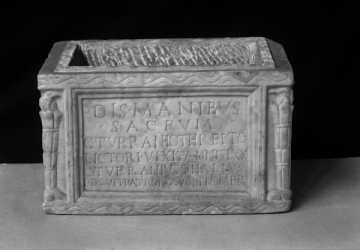Explore Collections


You are here:
CollectionsOnline
/
A Roman funerary urn (cinerarium) with a rectangular name plate between lighted torches
Browse
A Roman funerary urn (cinerarium) with a rectangular name plate between lighted torches
Mid 1st century to late 1st century AD
Fine-grained Greek mainland marble
Height (excluding slab): 17cm
Width: 30cm, at top
Length: 20cm, at top
Width: 30cm, at top
Length: 20cm, at top
Inscription: DIS. MANIBVS / SACRVM / C. TVRRANIO THREPTO / LICTORI. VIXIT. ANNIS. LXX / C. TVRRANIVS THALLVS / POSVIT. PATRONO SVO. BENE MER
Dis Manibus sacrum C[aio] Turranio Threpto lictori vixit annis LXX C[aius] Turranius Thallus posuit patrono suo bene mer[enti]
Inscription marks: Lines 1-5: lettercutter’s guidelines visible.
Line 1: 15mm; Line 2: 13mm; Lines 4-5: 13mm; Line 6: 10mm.
Inscription note: A lictor was a magistrate’s attendant.
We are grateful to Dr. Charlotte Tupman, a scholar of epigraphy (the study of inscriptions) undertaking postdoctoral research at King’s College London, who took squeezes of the inscriptions on antiquities in the Museum in 2007, for her transliteration, translation and notes/bibliography of the inscription on this piece.
Inscription translation: Sacred to the spirits of the departed. To Caius Turranius Threptus, lictor, who lived seventy years, Caius Turranius Thallus set it up for his well-deserving patron.
Dis Manibus sacrum C[aio] Turranio Threpto lictori vixit annis LXX C[aius] Turranius Thallus posuit patrono suo bene mer[enti]
Inscription marks: Lines 1-5: lettercutter’s guidelines visible.
Line 1: 15mm; Line 2: 13mm; Lines 4-5: 13mm; Line 6: 10mm.
Inscription note: A lictor was a magistrate’s attendant.
We are grateful to Dr. Charlotte Tupman, a scholar of epigraphy (the study of inscriptions) undertaking postdoctoral research at King’s College London, who took squeezes of the inscriptions on antiquities in the Museum in 2007, for her transliteration, translation and notes/bibliography of the inscription on this piece.
Inscription translation: Sacred to the spirits of the departed. To Caius Turranius Threptus, lictor, who lived seventy years, Caius Turranius Thallus set it up for his well-deserving patron.
Museum number: M410
On display: Catacombs
All spaces are in No. 13 Lincoln's Inn Fields unless identified as in No. 12, Soane's first house.
For tours https://www.soane.org/your-visit
Curatorial note
The large name plate on this urn is between two broad fillets enriched with wave-pattern incised lines and framed in a three element moulding, and is inscribed:
DIS MANIBVS
SACRVM
C·TVRRANIO THREPTO
LICTORI·VIXIT·ANNIS·LXX
C·TVRRANIVS THALLVS
POSVIT·PATRONOS VOBENEMER
The family from which this Caius Terranius Threptus took his name was distinguished in early Imperial history and civic affairs. A.C. Turranius Threptus was Praefectus Annonae from 14 to 48 AD and is mentioned by both Tacitus and Seneca.1 His father was Praefectus in Egypt under Augustus a decade before. This urn should be dates from the middle to the later first century AD.
The dominant motive of this type of cinerary urn front is the two upright lighted torches in the corner recesses either side of the name plate.2
1 Seneca, Dialogues, X. 20, 3.
2 See W. Altmann, Dir römischen Grabaltäre der Kaiserzeit, Berlin, 1905 , "Verwendung von Fackeln, Dreifüssen, Kandelabern and Palmen". Chapter X, esp. no.110, fig.92.
DIS MANIBVS
SACRVM
C·TVRRANIO THREPTO
LICTORI·VIXIT·ANNIS·LXX
C·TVRRANIVS THALLVS
POSVIT·PATRONOS VOBENEMER
The family from which this Caius Terranius Threptus took his name was distinguished in early Imperial history and civic affairs. A.C. Turranius Threptus was Praefectus Annonae from 14 to 48 AD and is mentioned by both Tacitus and Seneca.1 His father was Praefectus in Egypt under Augustus a decade before. This urn should be dates from the middle to the later first century AD.
The dominant motive of this type of cinerary urn front is the two upright lighted torches in the corner recesses either side of the name plate.2
1 Seneca, Dialogues, X. 20, 3.
2 See W. Altmann, Dir römischen Grabaltäre der Kaiserzeit, Berlin, 1905 , "Verwendung von Fackeln, Dreifüssen, Kandelabern and Palmen". Chapter X, esp. no.110, fig.92.
This seems likely to be the urn recorded as purchased by Soane at the Duke of St. Albans sale, Christie's, 29th April, 1801, Lot 87 A small cinerary urn and cover, with inscription, &c. £27.6.0. This urn matches the description being small and having an inscription as its only decoration. There are other cineraria with inscriptions amidst other decoration but none of them are obvious candidates to describe as 'small' whilst this urn is appreciably smaller than all Soane's others.
Literature
Corpus Incriptionum Latinarum (CIL), VI, i, 1912.
Soane collections online is being continually updated. If you wish to find out more or if you have any further information about this object please contact us: worksofart@soane.org.uk


